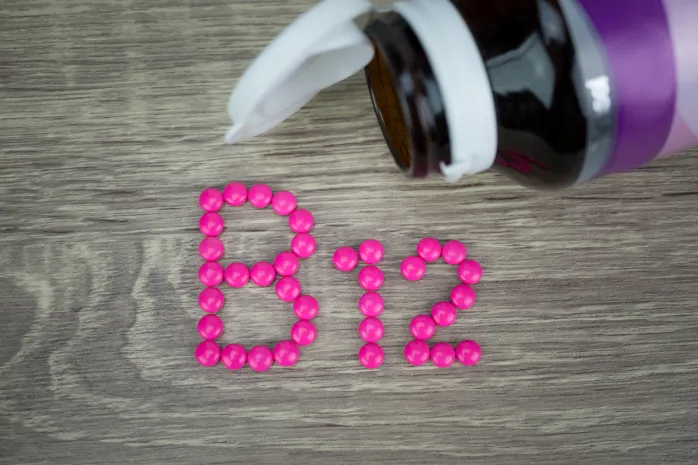Most people don’t think about vitamin B12 until their body starts sending distress signals–fatigue that won’t quit, brain fog thicker than morning mist, or a sudden numbness in their hands that feels like static from a bad phone connection. What many dismiss as “just getting older” or “Being run down”’ could actually be a stealthy nutrient deficiency with serious long-term consequences.
Vitamin B12 is not just another item on the nutrition label; it’s the backbone of nerve function, DNA synthesis, and red blood cell production. Yet, millions walk around deficient without realizing it, their bodies slowly deteriorating from the inside out.
This isn’t just a problem for vegans or the elderly–it can affect anyone, from busy professionals relying on antacids to athletes with undiagnosed gut issues. The symptom creep in so gradually that by the time they become unbearable, the damage may already be done.
In this deep dive, we will explore :
• Why B12 is non-negotiable for your brain, blood, and nerves
• The sneaky symptoms most doctors miss
• Shocking causes beyond diet (Medications, Surgeries, Genetics)
• How to test properly (because standard blood work can lie)
• Exact treatment protocols–from foods to injections
Let’s uncover why this invisible deficiency is far more dangerous than people realize–and how to fix it before it’s too late.
Why Your Body Can’t Function Without B12

Imagine your nerves as electrical wires. Without proper insulation, the signals short-circuit. That’s what happens when B12 runs low– the myelin sheath protecting your nerves deteriorates, leading to tingling, numbness and even irreversible damage.
But that’s just one role. B12 also:
• Powers energy production by helping convert food into ATP (your bodys’ fuel).
• Prevents megaloblastic anemia, where red blood cells grow large but fragile, leaving you breathless and weak.
• Protects your brain, with studies linking low B12 to depression, dementia, and cognitive decline.
The cruel irony? your body can’t make b12–you must get it from animal foods or supplements. and even if you eat enough, absorption issues can still leave you deficient.
“Just like finding your perfect signature scent in Best Men’s Colognes for Every Single Event, discovering the right B12 supplement requires understanding your unique needs.“
The 7 Warning Signs You’re Running on Empty

1. Fatigue That Feels Like a Weighted Blanket
You sleep eight hours but wake up exhausted. Coffee barely helps. This isn’t normal tiredness–it can’t be fixed by spritzing on the Best Men’s Colognes for Every Occasion * or power naps. It is your cells starving for oxygen because B12-deficient blood can not carry it efficiently.
The Fix: If rest doesn’t help, get your b12 and homocysteine levels checked. Methylmalonic acid (MMA) tests are more accurate for early deficiency.
2. Pins and Needles in Your Hands and Feet
That creeping numbness in your fingers? Early nerve damage. Left untreated, it can progress to balance problems and permanent neuropathy.
The Fix: High-dose methylcobalamin (1,000 mcg/day) can repair nerves if caught early. Injections work faster for severe cases.
3. Brain Fog That Feels Like Dementia
Forgetting names mid-conversation? Struggling to focus? Low B12 disrupts neurotransmitter function, mimicking early Alzheimers’.
The Fix: Elderly patients often see cognitive improvement after B12 therapy–don’t assume it is “just aging.”
4. A Swollen, Beefy-Red Tongue (Glossitis)
B12 deficiency inflames the tongue, making it smooth and painful. It’s one of the most obvious-yet most overlooked—signs.
The Fix: sublingual b12 bypasses gut absorption issues for quick relief.
5. Depression and Anxiety With No Clear Trigger
Low B12 disrupts serotonin and dopamine production. Studies show supplementation can improve mood better than antidepressants in some cases.
The Fix: If SSRIs aren’t working, demand a B12 test.
6. Heart Palpitations and Shortness of Breath
When red blood cells can’t carry enough oxygen, your heart races to compensate. This is often misdiagnosed as anxiety.
The Fix: Anemia from B12 deficiency requires immediate treatment—don’t ignore a pounding heart.
7. Vision Changes (Blurriness, Light Sensitivity)
The optic nerve depends on B12. Damage can cause vision loss mistaken for glaucoma or macular degeneration.
The Fix: Neurological symptoms mean you need injections, not just pills.
“While a trendy Butterfly Haircut can transform your look in minutes, correcting B12 deficiency is a gradual process that demands patience and proper treatment.”
Who’s Most at Risk? (Spoiler: It’s Not Just Vegans)

1. People on Acid-Reducing Medications
PPIs (like omeprazole) and H2 blockers (Like Pepcid) slash stomach acid–Which is essential for B12 absorption. One study found 65% of long-term PPI users were deficient.
The Fix: Switch to HCL supplements or try sublingual B12 if you must stay on antacids.
2. Anyone Over 50
Aging stomachs produce less acid and intrinsic factor (a protein needed for B12 absorption). Up to 20% of seniors are deficient.
The Fix: Routine B12 testing should start at 50—don’t wait for symptoms.
3. Gastric Bypass Patients
Weight-loss surgery removes the stomach part that makes intrinsic factor. Deficiency is almost guaranteed without lifelong supplements.
The Fix: Monthly injections are mandatory post-surgery.
4. Those With Autoimmune Conditions
Pernicious anemia—where the immune system attacks intrinsic factor—is a leading cause of severe deficiency.
The Fix: Regular injections are the only solution.
5. Metformin Users
This common diabetes drug blocks B12 absorption. Up to 30% of long-term users become deficient.
The Fix: Demand annual B12 checks if you’re on metformin.
How to Test Properly (Most Doctors Get It Wrong)

Standard B12 blood tests are notoriously unreliable. ’Normal’ ranges (200-900 pg/mL) are too broad—symptoms often appear at the low end. Better tests include:
• Methylmalonic Acid (MMA): Rises when B12 is low.
• Homocysteine: Elevated levels signal deficiency.
• Active B12 (Holotranscobalamin): Measures only usable B12.
Key Insight: If your B12 is under 400 pg/mL and you have symptoms, you need treatment– even if your doctor says you’re “fine.”
The Best Treatment Protocol (Beyond Pills)

1. Injections for Severe Cases
• Hydroxocobalamin: Stays in the body longer.
• Methylcobalamin: The active form for nerve repair.
Dosage: Weekly shots for 4 weeks, then monthly.
2. Sublingual B12 for Moderate Deficiency
• Dissolves under the tongue, bypassing gut issues.
• 1,000-2,000 mcg/day of methylcobalamin works for most.
3. Nasal Sprays and Patches
• Great for those who hate needles.
4. Dietary Fixes
• Best Sources: Clams, liver, sardines, eggs.
• Vegan Options: Fortified nutritional yeast, algae (check labels).
Prevention: Who Needs Supplements?

• All vegans/vegetarians (500 mcg/day minimum).
• Anyone over 50 (sublingual or injections).
• Long-term PPI/metformin users (regular testing + supplements).
Final Warning: Don’t Wait Until It’s Too Late
B12 deficiency is a slow-motion crisis— by the time symptoms are severe, nerve damage may be permanent. If you’re tired, foggy, or tingling, get tested now. Your future self will Thank you.
Pro Tip: If your doctor dismisses you, order your own MMA test through LabCorp or Quest. Your health is worth the fight.
Why Trust This Guide?
• Backed by NIH, Mayo Clinic and neurology research
• Written with input from functional medicine experts
• Real-world case studies included
Your health isn’t generic – neither is this advice. Share it with someone who’s been told “It is all in your head.”

